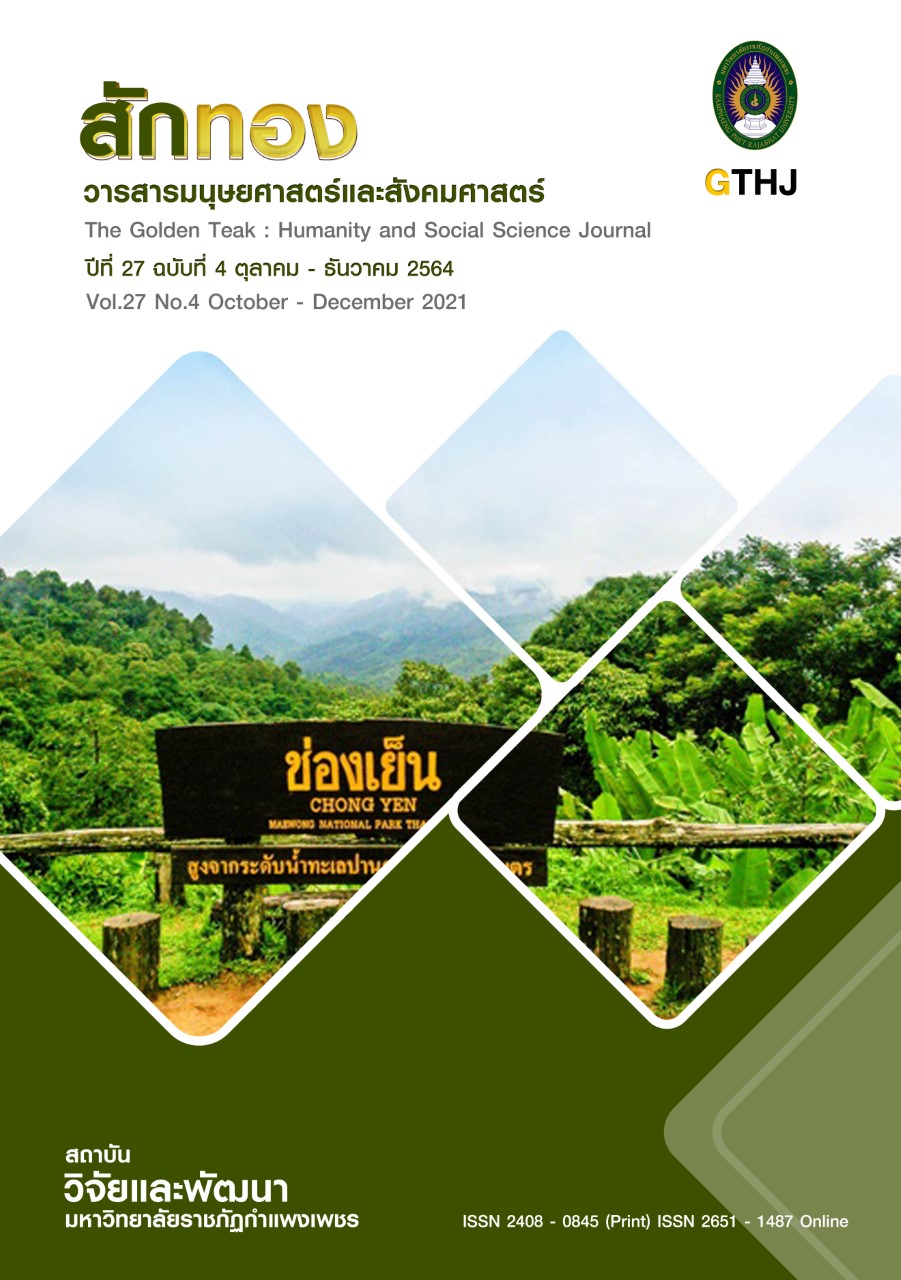Educational Management Guidelines for Knowledge-Based Cultural Tourism Development in Ban Tak district, Tak province
Main Article Content
Abstract
ABSTRACT
The purposes of the study 1) to study the tourism situation and the potential of cultural tourism management 2) to study the current conditions in educational management for cultural tourism development and 3) to establish educational management guidelines for cultural tourism development based on the knowledge base of Ban Tak District, Tak province. The study was carried out by using the qualitative research procedure which was divided into three steps as follows; Step 1: Study and analyze of tourism situation and cultural tourism management potential by means of in-depth interview. Step 2: Study and analyze the current conditions by means of in-depth interview. Step 3: Establish educational management guidelines for cultural tourism development based on Ban Tak district, Tak province. Data from steps 1 and 2 were utilized to draft educational management guidelines for cultural tourism development based on district knowledge Ban Tak, Tak Province The suitability of the educational management approach by using focus group discussions was examined by seven experts selected by purposive selection. The findings indicated was classified into three systems, The results of the study were also found that there were three main issues on an educational management guidelines for cultural tourism development based on Ban Tak district, Tak province by emphasizing on community-based education, work-based education, and happiness based education.
Article Details
บทความที่ได้รับการตีพิมพ์เป็นลิขสิทธิ์ของวารสาร สักทอง : วารสารมนุษยศาสตร์และสังคมศาสตร์ สถาบันวิจัยและพัฒนา มหาวิทยาลับราชภัฏกำแพงเพชร
ข้อคิดเห็นใดๆ ที่ปรากฎในวารสารเป็นวรรณกรรมของผู้เขียนโดยเฉพาะ ซึ่งมหาวิทยาลัยราชภัฏกำแพงเพชรและบรรณาธิการไม่จำเป็นต้องเห็นด้วย
References
Chalermchai, Y., et al. (2000). Research report on the model and development of family education in Thai society. Bangkok : Sweet pepper graphics.
Chanasit, K. & Sangraksa, N. (2018). Guidelines for the development of tourist attractions Culture of Khlong Dan Floating Market, Ranot District, Songkhla Province. university academic journal Thonburi, 12(28), 163-176.
Chittangwattana, B. (2005). Sustainable tourism development. Bangkok : Press and design.
Kaset Siri, C. (1997). Thai Way : Cultural Tourism. Bangkok : The Trajectory Project.
Khuiyaphai, K. (2009). Cultural Tourism: A Case Study of Ban Luang Nuea, Luang Nuea Subdistrict, Doi Saket District. Chiang Mai Province. Bangkok : Chiang Mai University.
Klindeplee, J. (1998). Evaluation of potential of tourist destinations for ecotourism : a case study of Sai Yok National Park. Kanchanaburi province. Environmental Management Course Term Paper. Bangkok : Office of Graduate Studies National Institute of Development Administration.
Laochokchaikul, K. (2014, July-December). The process of managing cultural attractions in the old market and floating markets for tourism. International Thai Tourism Journal, 10(2), 32-41.
Lumsdon. (1999). Motivation and Personnality. Bangkok : Express Net.
McIntosh, Robert W. (1980). Tourism : Principles, Practices, Philosophies. New York : Wiley Press.
Ministry of Education. (1998). Educational Development Guide 1998. Bangkok : Ministry of Education.
_______. (1999). National Education Act 1999. Bangkok : Siam Sport Syndicate Company Limited.
Nakphop, C. (2018, May-August). studied the model of participatory cultural tourism management of Kei Chai Community, Chum Saeng District, Nakhon Sawan Province. Walai Alongkorn Journal Review (Humanities and Social Sciences), 8(2), 71-80.
Nanthawan Na Ayutthaya, S. (2009). Community-Centered Cultural Tourism Management. independent research Master of Arts (Political Economics). Chiang Mai : Chiang Mai University.
Northern Bureau of Economic and Social Development Office of the National Economic and Social Development Board. (2018). The result of the brainstorming meeting Driving the Integrated Northern Development (Northern Forum). Bangkok : Northern Bureau of Economic and Social Development Office of the National Economic and Social Development Board.
Office of the Ministry of Culture of Tak Province. (2013). Carrying out missions assigned by the Cultural Surveillance. Tak : Office of the Ministry of Culture of Tak Province.
_______. (n.d). Tak Province History. [Online]. Available : https://www.m-culture.go.th/tak/main.php?filename=index [2016, November 9].
Piwpun, K., et al. (2018, January-June). Knowledge management of cultural tourism in Phetchabun province to enhance competitiveness and cooperation in supporting the integration of the ASEAN Community. Journal of the College of Asian Studies, 8(1), 27-33.
Rojanasunthorn, T. (1999). Summary of the Seminar on Northern Tourism Development. Bangkok : Tourism Authority of Thailand.
Srisurak, C. (2018) studied the integration of local education management based on wisdom and educational institutions in the development and solution of education in the community of Muang Pattana Municipality. Chiang Mai : Chiang Mai Rajabhat University.
Sriphan, A. (2018). Education based on life and community When people rise to reform education. Bangkok : Daxax Intercorporation.
Suwanphimol, K. (2005). Meaning of tourists. Bangkok : Pearson Education, Indochina.
Thongpheng, J. (2011). The opinions of tourists towards the cultural tourism management of Sothon Wararam Wihan Temple Chachoengsao Province. Master of Public Administration Thesis, Burapha University, Faculty of Public Administration, Department of Public and Private Management.
Wongwipak, C. (2002). The benefits of cultural tourism. Teaching documents, Professional Experience Program in Tourism Management. Bangkok : Sukhothai Thammathirat Open University.


